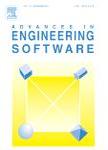版权所有:内蒙古大学图书馆 技术提供:维普资讯• 智图
内蒙古自治区呼和浩特市赛罕区大学西街235号 邮编: 010021

作者机构:Yangtze Univ Sch Informat & Math Jingzhou Hubei Peoples R China Hubei Engn Univ Sch Math & Stat Xiaogan Hubei Peoples R China Yangtze Univ Jingzhou Hosp Jingzhou Hubei Peoples R China
出 版 物:《ADVANCES IN ENGINEERING SOFTWARE》 (Adv Eng Software)
年 卷 期:2025年第202卷
核心收录:
学科分类:08[工学] 0835[工学-软件工程] 0812[工学-计算机科学与技术(可授工学、理学学位)]
主 题:Future information Improved particle swarm optimization algorithm Non-equidistant grey prediction evolutionary Particle swarm optimization algorithm
摘 要:Particle swarm optimization (PSO) and its numerous performance-enhancing variants area kind of stochastic optimization technique based on collaborative sharing of swarm information. Many variants took current particles and historical particles as current and historical information to improve their performance. If future information after each current swarm can be mined to participate in collaborative search, the algorithmic performance could benefit from the comprehensiveness of the information including historical, current and future information. This paper proposes a composite particle swarm optimization algorithm with future information inspired by non-equidistant grey predictive evolution, namely NeGPPSO. The proposed algorithm firstly employs non-equidistant grey predictive evolution algorithm to predict a future particle as future information for each particle of a current swarm. Secondly, four particles including prediction particle, particle best and swarm best of the current swarm, and a history memory particle are used as guide particles to generate four candidate positions. Finally, the best one in the four positions is greedily selected as an offspring particle. Numerical experiments are conducted on 42 benchmark functions given by the Congress on Evolutionary Computation 2014/2022 and 3 engineering problems. The experimental results demonstrate the overall advantages of the proposed NeGPPSO over several state-of-art algorithms.